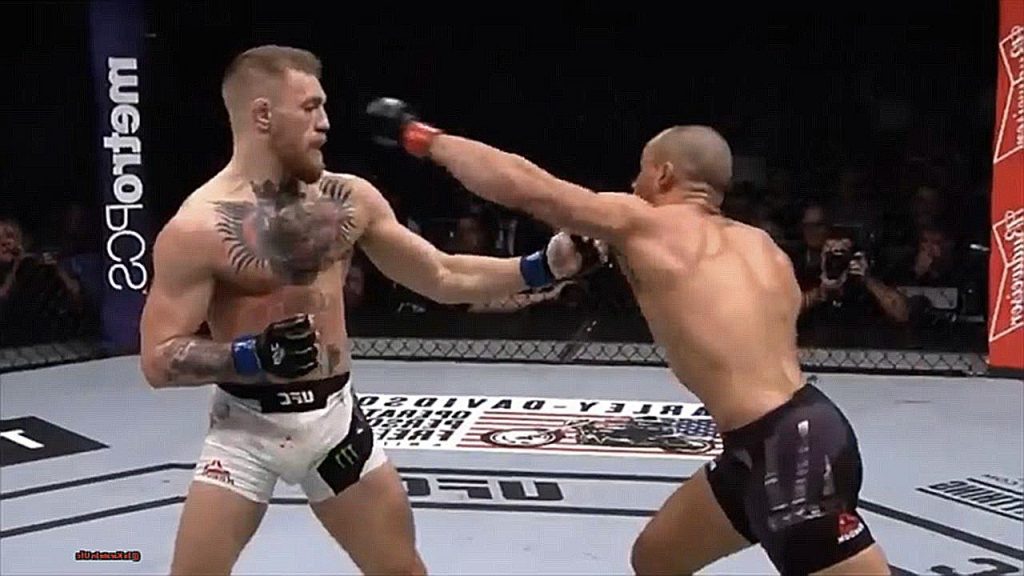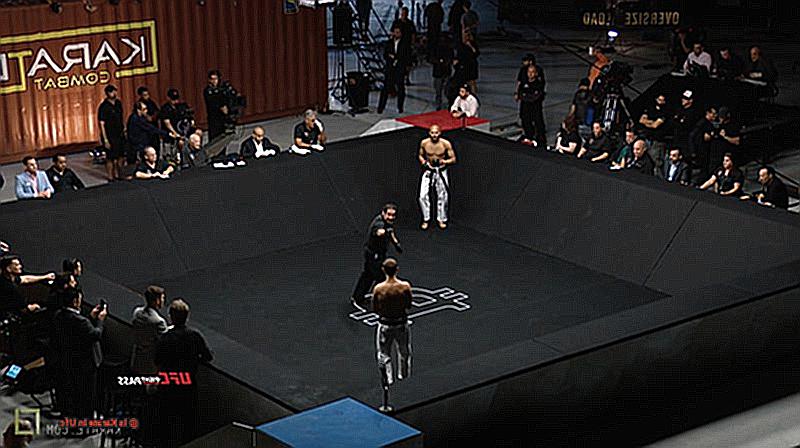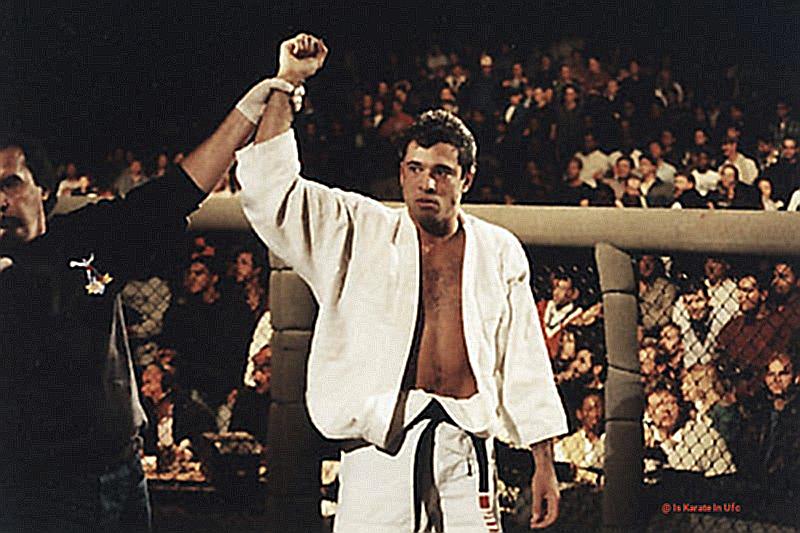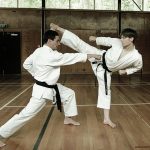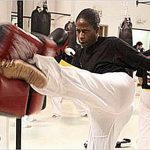Welcome to the electrifying world of UFC, where warriors clash in the octagon using a diverse range of martial arts techniques.
One such style that has taken the spotlight is the ancient practice of karate, known for its dynamic kicks and precise strikes. In this blog post, we’ll dive into the captivating history and evolution of karate in UFC, exploring its techniques and notable fighters.
We’ll also uncover how karate has influenced other martial arts within UFC and its impact on modern-day fighting strategies. So put on your gi and get ready to step into the ring as we unveil the intriguing role of karate in UFC.
Let’s begin.
The History and Origins of Karate in UFC
The world of Mixed Martial Arts (MMA) has been revolutionized by the integration of traditional Japanese martial arts, particularly karate. This integration has enhanced the diversity and effectiveness of MMA, making it a more dynamic and versatile sport. It is no surprise that karate’s influence can be seen in the training techniques, mindset, and culture of MMA fighters.
| The Influence of Karate on MMA Training | Karate-Trained Fighters in the UFC | The Impact on MMA |
| Karate’s striking techniques, footwork, and defensive strategies have been incorporated into MMA training, elevating the level of diversity and effectiveness. | Karate-trained athletes like former UFC champion Lyoto Machida have brought karate’s unique techniques and principles into the UFC. | As a result, MMA has evolved into a more dynamic and versatile sport, with athletes utilizing karate’s techniques to their advantage. |
| Karate’s emphasis on discipline, mental focus, and self-control has had a significant influence on the mindset of MMA fighters. | The code of conduct within the UFC promotes an atmosphere of sportsmanship and respect for opponents, influenced by karate’s core values. | Thanks to karate’s influence, an environment of respect and humility has been fostered among fighters in the UFC. |
| Karate’s unique katas and kihon serve as a foundation for developing discipline and fluid motion in MMA training. | Karate’s principles and techniques are often incorporated into MMA training, helping to enhance athletes’ overall skills and abilities. | The incorporation of karate into MMA training has enriched the diversity and effectiveness of the sport in the UFC. |
The integration of karate into the UFC has had a significant impact on the sport, elevating its diversity and effectiveness. Karate’s principles and techniques continue to play a crucial role in the development and success of MMA athletes in the UFC.
The Evolution of Karate Techniques in UFC
The utilization of karate techniques in UFC has undergone considerable evolution over the years, from its initial introduction in the early 1990s to becoming an integral part of many fighters’ repertoire today. It has emerged as a formidable force in MMA, bringing a distinctive element to the sport and shaping the mindset, preparation, and ethos of fighters. This transformation can be credited to the efficacy of these techniques in the octagon and the impact of elite fighters who have incorporated karate into their fighting style.
One such fighter is Stephen “Wonderboy” Thompson, a former kickboxing and karate champion who has found success in UFC utilizing his karate background. In an interview with Joe Rogan, he shared how his karate training has influenced his fighting style, giving him an advantage in striking and footwork. He also mentioned how his unique approach has helped him stand out in a sport dominated by traditional martial arts like boxing and wrestling.
The rise of karate in UFC has also led to a shift in training methods for fighters, with many incorporating karate techniques into their practices. This has not only improved their striking abilities but also enhanced their overall agility and movement in the cage. Additionally, it has broadened the diversity of techniques used in fights, making for more unpredictable and exciting matchups.
The impact of karate on the culture of UFC cannot be underestimated either. It has brought a new level of respect and appreciation for traditional martial arts, breaking away from the perception that they are outdated or ineffective in modern combat sports. As a result, it has attracted a new generation of martial artists to learn and master this discipline.
The Role of Karate in Modern MMA Training
The art of Karate has undergone a significant transformation and evolution since its inception in Okinawa, Japan. Over the years, it has become an integral part of modern MMA training, offering a unique blend of striking techniques and philosophical principles to the sport. In this article, we will delve deeper into the role of karate in modern MMA training and how it has impacted the sport.
| The Transformation of Karate | Impact on Modern MMA Training | Real-Life Examples |
| Karate originated in Okinawa, Japan, and was influenced by Chinese martial arts and Zen Buddhism. | The incorporation of Zen principles into karate training has helped fighters develop mental focus and discipline, which are crucial in MMA. | An example of this is former UFC champion Lyoto Machida, who utilizes principles from his background in Shotokan Karate to enhance his mental strength and approach to training. |
| The art evolved from unarmed combat techniques developed during the 17th century when weapons were banned in Okinawa. | The practicality and efficiency of karate’s striking techniques have made it a valuable addition to MMA training, providing fighters with a diverse range of attacks. | One such fighter is top UFC welterweight contender Stephen “Wonderboy” Thompson, known for his explosive kicks and fluid movements influenced by his background in karate. |
| Initially practiced in secret, karate was introduced to mainland Japan in the early 20th century by Gichin Funakoshi. | The expansion of karate to mainland Japan opened up opportunities for cross-training with other martial arts styles, leading to the development of new techniques and strategies. | A prime example of this is Lyoto Machida’s brother, Chinzo Machida, who has a black belt in both Shotokan Karate and Brazilian Jiu-Jitsu, showcasing the effectiveness of combining these styles in MMA. |
| Funakoshi’s teachings emphasized not only physical aspects but also philosophical and spiritual dimensions of karate. | The incorporation of philosophical principles in karate training has helped fighters develop a strong mindset and overcome mental challenges in the cage. | Former UFC champion Georges St-Pierre is a testament to this, known for his disciplined approach to training and embracing the “way of the warrior,” which he attributes to his background in Kyokushin Karate. |
| Karate has become a popular global phenomenon, with millions of practitioners worldwide and inclusion as an official sport in the Olympic Games. |
Comparing Karate and Other Martial Arts in UFC
When it comes to effectiveness in the UFC, karate may not be as dominant as other martial arts, but it certainly has its strengths and can hold its own in the octagon. Let’s take a closer look at how karate stacks up against other martial arts when it comes to fighting in the UFC.
Strengths of Karate:
- High Pain Tolerance: One of the standout qualities of karate practitioners is their remarkable ability to endure pain, which is crucial in MMA where fighters are subjected to intense physical contact and pain during fights.
- Lateral Movements: Karate involves a lot of lateral movements, which can prove to be advantageous in evading strikes and creating angles to attack opponents.
- Quick and Explosive Strikes: Emphasizing speed and explosive strikes, karate has the potential to catch opponents off guard and lead to swift knockouts or submissions.
Comparison Table:
| Martial Art | Strengths | Notable MMA Fighters |
|---|---|---|
| Karate | High Pain Tolerance, Lateral Movements, Quick and Explosive Strikes | Stephen “Wonderboy” Thompson, George St. Pierre, Michelle Waterson |
| Muay Thai | Devastating Kicks, Strong Clinch Work | Anderson Silva, Joanna Jedrzejczyk, Jose Aldo |
| Wrestling | Dominant Takedowns and Control on the Ground | Jon Jones, Khabib Nurmagomedov, Daniel Cormier |
| Brazilian Jiu-Jitsu | Elite Ground Game and Submission Techniques | Demian Maia, Royce Gracie, Ronda Rousey |
| Boxing | Precise and Powerful Punching | Conor McGregor, Amanda Nunes, Cain Velasquez |
As evident from the table, karate has its own unique set of strengths and has given rise to successful MMA fighters. However, it is important to note that MMA is a culmination of various martial arts and no single discipline can reign supreme. Karate practitioners who are well-versed in other martial arts can prove to be extremely effective in the octagon. In fact, many MMA fighters have a background in karate and incorporate its techniques alongside other disciplines.
While karate may not dominate over other martial arts in the UFC, it still has its own strengths and can be a formidable force in the octagon.
Its emphasis on speed, power, and lateral movements can catch opponents off guard and lead to victories.
How Karate Principles Can Benefit UFC Fighters
Utilizing principles from karate in training and performance can be a game-changer for UFC fighters. By incorporating these principles, UFC fighters can reap numerous benefits that will enhance their skills and performance in the octagon.
| Physical Fortitude: Strength, Speed, and Agility | Mental Focus and Discipline | Proper Technique and Body Mechanics |
| Better Balance, Coordination, and Body Control | Tactical Mindset and Philosophical Understanding | Self-Defense Techniques |
Physical Fortitude: Strength, Speed, and Agility:
One of the key aspects of karate training is its emphasis on physical conditioning. Through the practice of repetitive movements, strikes, kicks, and stances, UFC fighters can develop strong muscles and improve overall physical strength. Moreover, the fast-paced nature of karate training also helps to sharpen speed and agility – essential skills for any fighter in the octagon.
Mental Focus and Discipline:
Karate is not just about physical strength; it also requires mental fortitude. The discipline instilled in karate training can help UFC fighters develop a resolute mindset and laser-sharp focus during fights. The emphasis on breathing techniques and meditation can also aid in controlling mental calmness and composure in high-pressure situations.
Proper Technique and Body Mechanics:
The use of proper technique and body mechanics is crucial in karate training. This translates seamlessly into the octagon as it allows UFC fighters to utilize maximum striking power while minimizing injury risk. By incorporating karate principles, UFC fighters can also become more efficient with their movements, conserving energy for longer fights.
Better Balance, Coordination, and Body Control:
Karate training involves a myriad of exercises aimed at enhancing balance and coordination – skills that are immensely beneficial for UFC fighters. Improved balance and coordination allow for better control over movements and aid in evasive maneuvers in the octagon. The focus on body control in karate also enables UFC fighters to execute techniques with precision and accuracy.
Tactical Mindset and Philosophical Understanding:
Karate is not just a martial art; it also has a strong philosophical foundation. By delving into the principles and philosophy of karate, UFC fighters can develop a strategic mindset in the octagon. This includes analyzing opponents’ movements and identifying weaknesses to exploit, as well as maintaining a calm and composed mindset during fights.
Self-Defense Techniques:
Aside from training for the octagon, UFC fighters can also benefit from learning self-defense techniques from karate. These techniques can prove valuable in real-life situations outside of the octagon, equipping UFC fighters with essential skills for self-protection.
In conclusion, incorporating karate principles in training and performance can be highly advantageous for UFC fighters. The physical and mental aspects of karate training can improve strength, speed, agility, mental focus, and discipline.
Common Misconceptions About Karate in UFC
Some of these include the misconception that karate is solely based on physical strength and aggression, promotes violence and aggression, and is outdated or obsolete. Furthermore, there is a misguided belief that all forms of karate are identical and that one can obtain a black belt quickly. However, these misunderstandings fail to capture the true essence of karate and its significance in UFC.
To clarify, karate is not solely about physical strength and aggression. While it does involve physical skills and techniques, it also emphasizes mental discipline, focus, and self-control. In fact, many practitioners of karate find that it improves their overall well-being and helps them develop important life skills such as respect, perseverance, and humility.
Contrary to popular belief, karate does not promote violence or fighting. Rather, it teaches students how to defend themselves and others in a controlled and responsible manner. This is especially important in UFC where fighters must adhere to strict rules and regulations to ensure safe competition.
While some may view karate as outdated or irrelevant in modern times, the truth is that it has evolved and adapted over the years to remain effective and relevant. In fact, many UFC fighters incorporate elements of karate into their training due to its practicality and effectiveness in real-life combat situations.
Another misconception about karate is that all styles are the same. However, there is a wide range of styles with unique techniques, philosophies, and origins. Becoming a black belt in any style of karate takes time, dedication, and consistent practice. It is not something that can be achieved quickly or easily.
In conclusion, it is important to understand that karate plays a significant role in UFC beyond just physical strength and aggression. It promotes discipline, respect, and self-defense while continuously evolving to remain relevant in modern times.
The Future of Karate in the World of UFC
The future of karate in the world of UFC is shining bright as it maintains a significant presence in the sport. The growing popularity of MMA and its integration of diverse martial arts styles have only added to the relevance and value of karate.
Impact on UFC:
- The integration of varied martial arts styles in the UFC has resulted in a more well-rounded and dynamic sport.
- With its distinctive striking techniques, karate brings diversity and unpredictability to fights.
- UFC fighters with backgrounds in karate have achieved success, proving its effectiveness in the octagon.
- The rise of MMA has also brought attention to traditional martial arts such as karate, sparking increased interest and participation.
- The expansion of MMA has also opened doors for karate practitioners to compete in other promotions and organizations.
Impact on Karate:
- The growing popularity of MMA has given karate a platform to showcase its techniques and advantages to a broader audience.
- This has led to a resurgence in fascination with traditional martial arts and an increase in students seeking to learn karate.
- Karate’s inclusion in popular MMA promotions like UFC has also brought acknowledgement and validation to the art form.
- This has resulted in more opportunities for karate practitioners to compete professionally and gain recognition for their skills.
- As MMA continues to evolve, incorporating elements from various martial arts styles, karate will also continue to develop and remain relevant in the world of UFC.
So, the future of karate in the world of UFC is shining brightly. The growing popularity of MMA and its incorporation of diverse martial arts styles have only elevated the relevance and value of karate. It continues to play a substantial role in UFC, bringing diversity and unpredictability to fights. The expansion of MMA has also provided opportunities for karate practitioners to compete professionally and gain recognition for their skills.
Conclusion
In conclusion, the electrifying world of UFC has been greatly enhanced by the incorporation of traditional Japanese martial arts, particularly karate. This ancient practice has brought a new level of diversity and effectiveness to the sport, captivating audiences worldwide with its dynamic kicks and precise strikes.
From its origins in Okinawa to becoming an integral part of modern MMA training, karate has undergone a significant transformation and evolution. Its influence can be seen not only in the techniques used by fighters but also in their mindset and approach to training.
While it may not hold the same dominance as other martial arts in the UFC, such as Muay Thai or wrestling, karate brings its own unique strengths to the octagon. With high pain tolerance, lateral movements, and quick and explosive strikes, karate-trained fighters have proven to be formidable opponents.
As we witness the continued evolution of karate techniques in UFC and their impact on modern-day fighting strategies, one thing is certain – this ancient practice will continue to play a crucial role in shaping the electrifying world of UFC for years to come.

